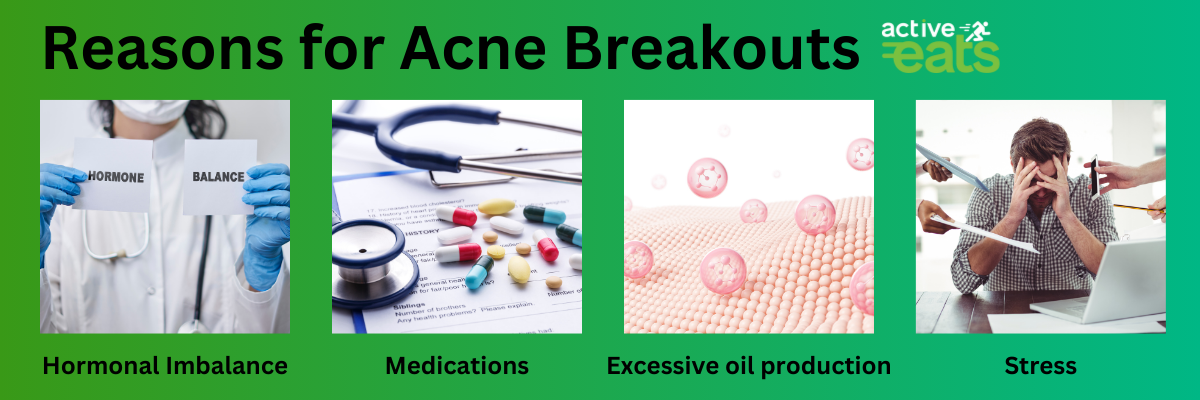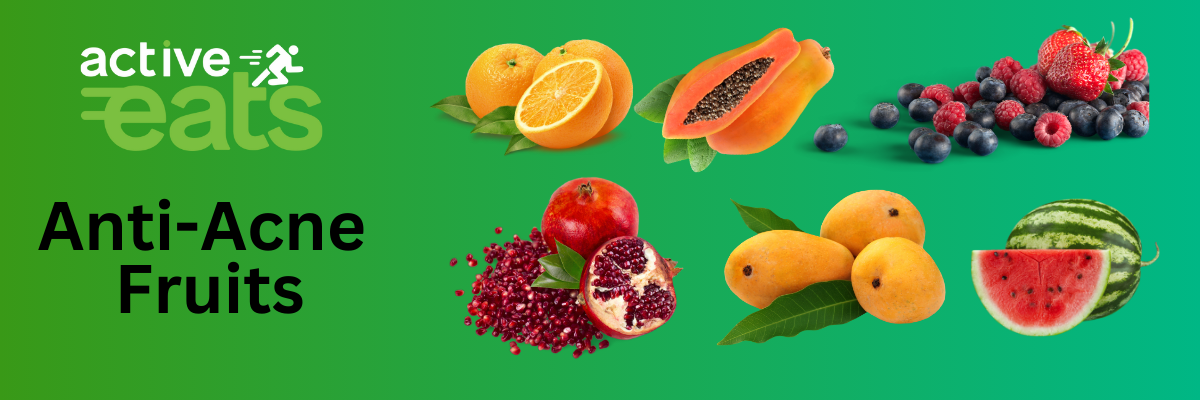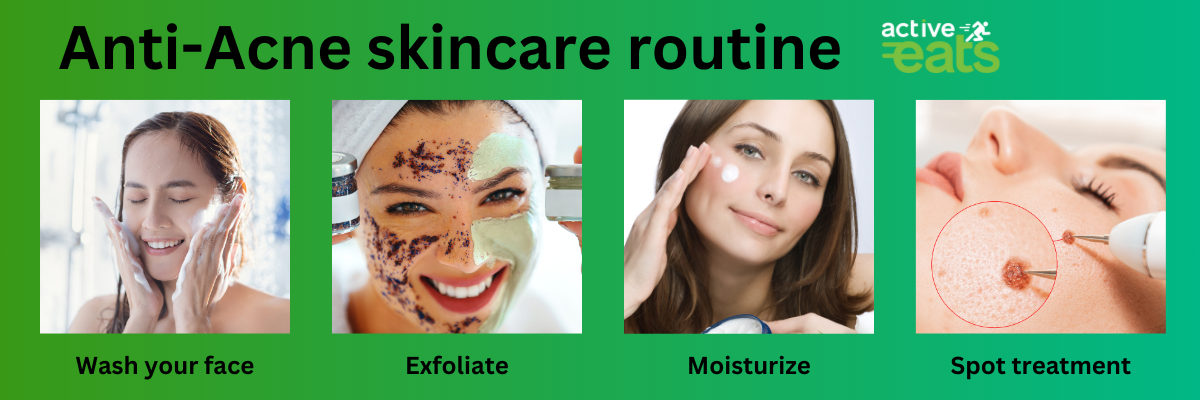Clearing the Path to Radiant Skin: Nourishing Your Complexion with an Anti-Acne Diet
Welcome to our blog post on the Anti-Acne Diet! This article is dedicated for you if you’ve been struggling with acne and are looking for ways to improve your skin. Here, We will discuss the causes of acne breakouts, the power of an anti-acne diet, the benefits of including anti-acne fruits in your diet, adopting an anti-acne lifestyle, effective home remedies for acne, balancing hormones to combat acne, managing stress, avoiding acne trigger foods, maintaining a consistent skincare routine, and many more topics to help you with your acne. By the end of this post, you’ll have valuable insights and tips to help you achieve clear and healthy skin. So let’s dive in and clear all your acnes!
Understanding How Acne Forms
When the skin pores becomes blocked with oil and dead skin cells, acne pops out of the skin. This skin blockage creates a favorable environment for acne-causing bacteria to thrive, leading to inflammation and the formation of pimples.
Propionibacterium acnes is a type of bacteria commonly found on the skin which can multiply excessively and cause inflammation, leading to acne breakouts.
Additionally, hormonal changes in the body can leads to increase in sebum (oil) production, leading to acne. During puberty, the hormonal changes can cause an increase in androgen hormone levels, which in turn stimulates the sebaceous glands to produce more oil. Hormonal changes during pregnancy can also lead to acne breakouts.
Other factors like stress, diet, and genetics can also play a role in acne formation. Stress can trigger hormonal imbalances and increase inflammation, which can worsen acne. Certain diets high in processed foods and sugars can also contribute to acne breakouts. Also, there can be a genetic predisposition to acne, making some individuals more prone to developing it.
Reasons for Acne Breakouts
Acne breakouts can be caused by various factors:

- Hormonal changes during puberty or pregnancy can lead to acne.
- Excessive oil production in the skin can clog pores and contribute to acne breakouts.
- Certain medications, such as corticosteroids or lithium, can trigger acne.
- Stress and a high-sugar diet can also play a role in the occurrence of acne.
The Power of an Anti-Acne Diet
An anti-acne diet includes those food items which help reduce inflammation in the body and reduce oil production. It includes eating a variety of fruits, vegetables, whole grains, and lean proteins along with avoiding processed foods, sugary snacks, and high-glycemic index foods.
Also, regular exercise, outdoor walks and spending time with nature can help regulate your hormones which can increase inflammation and trigger acne breakouts.
High dairy intake has been linked to acne. Consider reducing your consumption of dairy products like milk, cheese, and yoghurt to see if it improves your skin.
Drink plenty of water and herbal teas to keep your skin well-hydrated. Proper hydration can help flush out toxins and reduce the occurrence of acne.
By adopting an anti-acne diet, you can support your skin’s health from the inside out. Remember to consult a healthcare professional for personalized advice and guidance.
Including Anti-Acne Fruits in Your Diet

Fruits like oranges, berries, and pomegranates are rich in antioxidants that help fight acne-causing bacteria. These fruits are packed with vitamins and minerals that can support clear skin.
Vitamin C found in citrus fruits can promote collagen production and reduce inflammation, making it beneficial for acne-prone skin.
Eating fruits high in vitamin A, such as mangoes and papayas, can help regulate oil production in the skin. This can prevent clogged pores and reduce the occurrence of acne breakouts.
Watermelon and cucumbers have high water content, which keeps the skin hydrated. Proper hydration is crucial for reducing acne and promoting overall skin health.
Adopting an Anti-Acne Lifestyle
Maintaining good hygiene by washing your face twice a day can prevent acne. It is important to use a gentle cleanser that is suitable for your skin type.
Avoid touching your face frequently, as it can transfer bacteria and irritate the skin. Remember to keep your hands clean and refrain from picking or popping acne.
Regular exercise and sufficient sleep can help reduce acne by managing stress levels. Exercise helps to improve blood circulation, which promotes healthy skin. Getting an adequate amount of sleep allows your skin to repair and rejuvenate itself.
Wearing sunscreen and avoiding excessive sun exposure can protect the skin from damage and reduce the risk of acne breakouts. Choose a sunscreen that is oil-free and non-comedogenic.
Tip: Look for sunscreens with an SPF of at least 50, and reapply every two hours when spending time outdoors.
Effective Home Remedies for Acne
Acne can often be managed with simple home remedies. Here are a few effective remedies you can try:
- Tea tree oil: Apply a few drops of tea tree oil directly onto the acne spots. Tea tree oil has antimicrobial properties that can help reduce inflammation and kill acne-causing bacteria.
- Aloe vera gel: Apply pure aloe vera gel onto the affected areas. Aloe vera has soothing properties that can help calm down irritated and inflamed skin.
- Honey and cinnamon mask: Mix equal parts honey and cinnamon to form a paste. Apply the mixture onto your face and leave it on for 10-15 minutes before rinsing off. This mask has natural antimicrobial properties and can help soothe acne-prone skin.
- Turmeric and honey paste: Create a paste by mixing turmeric powder with honey. Apply the paste onto acne scars or inflamed areas and leave it on for 10 minutes before rinsing off. Turmeric has anti-inflammatory properties that can help reduce redness and swelling.
- Clay mask or gentle exfoliator: Using a clay mask or a gentle exfoliator can help unclog pores and remove dead skin cells, reducing the occurrence of acne. Look for products specifically formulated for acne-prone skin.
Remember, everyone’s skin is different, so it’s important to test these remedies on a small patch of skin before applying them to your entire face. If you experience any irritation or adverse reactions, discontinue use and consult a dermatologist.
Balancing Hormones to Combat Acne
A diet high in omega-3 fatty acids and zinc can help balance hormones and reduce acne. Practicing stress-reducing techniques like yoga or meditation can also help balance hormones.
Consulting a healthcare professional for hormonal acne treatment options is recommended.
Avoiding Acne Trigger Foods
Foods high in sugar, refined carbohydrates, and dairy products can exacerbate acne.
Limiting the consumption of greasy and fried foods can help prevent acne breakouts.
Caffeine and alcohol can stimulate oil production and contribute to acne flare-ups.
Keeping a food diary can help identify trigger foods and make necessary dietary changes for clearer skin.
Maintaining a Consistent Skincare Routine
When it comes to preventing and managing acne, having a consistent anti-acne skincare routine is the key. Here are some essential steps to include:

- Wash your face: Use a gentle cleanser twice a day to remove dirt, oil, and impurities from your skin.
- Exfoliate: Regularly exfoliate your skin to slough off dead skin cells and unclog pores. However, be careful not to over-exfoliate, as it can irritate your skin further.
- Moisturize: Use a moisturizer specifically designed for acne-prone skin to keep your skin hydrated without clogging pores.
- Spot treatment: Apply a spot treatment with ingredients like benzoyl peroxide or salicylic acid to target and treat acne breakouts.
Remember to choose non-comedogenic skincare products, as they are less likely to clog pores and worsen acne. Additionally, always be gentle with your skin and avoid picking or squeezing pimples, as it can lead to scarring and further inflammation.
Conclusion
Taking care of your skin through a well-balanced diet and a consistent skincare routine is essential in managing and preventing acne breakouts. By understanding how acne forms and the various factors that contribute to its occurrence, you can make informed choices to combat acne. Adopting an anti-acne diet that includes antioxidant-rich fruits and avoiding trigger foods can significantly improve your skin’s condition. Additionally, incorporating stress-reducing techniques and maintaining a healthy lifestyle can further support clear skin. Finally, don’t forget to consult with a healthcare professional for personalized advice and treatment options for hormonal acne. By following these tips and being consistent in your skincare routine, you can achieve healthier and clearer skin.


Super Foods - coachactiveeats.com
[…] Clear Your Skin with Anti-Acne Super Foods […]
Unveiling the Top 5 Astonishing Benefits of Using Argan Oil | Coach Active Eats
[…] Acne Treatment: Despite being an oil, Argan oil is non-comedogenic, meaning it won’t clog pores. It also has anti-inflammatory properties so it is used to treat acne-prone skin . Applying a small amount to affected areas can help reduce redness and inflammation. […]